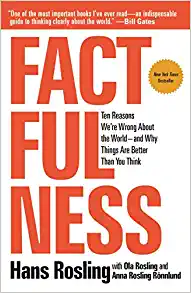By Hans Rosling | Summary
Introduction: The World Isn’t as Bad as You Think
In a world dominated by alarming headlines, social media outrage, and political polarization, it’s easy to believe that things are getting worse. War, poverty, disease, and inequality seem ever-present.
But in Factfulness, the late Hans Rosling—a Swedish physician, global health expert, and data visionary—makes a bold and uplifting claim:
“The world is not as dramatic as it seems.”
Using decades of data from global development, Rosling shows that most people have a distorted view of the world—even experts. He reveals that while global problems still exist, significant progress has been made across almost every major category of human well-being.
The Central Premise: Why We Get the World Wrong
The book is built around a simple yet powerful idea:
We systematically misunderstand the state of the world due to outdated knowledge, dramatic instincts, and media bias.
Rosling calls this the “Gap Instinct”—the tendency to split the world into binary extremes: rich vs. poor, good vs. bad, developed vs. developing. But the truth lies in the middle.
The Ten Dramatic Instincts (and How to Overcome Them)
Rosling identifies ten instincts that distort our worldview. Each one is explored with data, stories, and practical strategies to counteract them.
1. The Gap Instinct
The Misconception: The world is divided into two groups—rich and poor.
The Reality: Most people live in the middle, across four income levels.
Rosling’s powerful chart divides the global population into four income levels, showing that over 75% of people live in middle-income countries.
Tip: Learn to recognize the “majority in the middle” and avoid binary thinking.
2. The Negativity Instinct
The Misconception: Things are getting worse.
The Reality: In many areas—health, poverty, education—the world is improving.
Examples:
- Extreme poverty has dropped from 85% in 1800 to less than 9% today.
- Global life expectancy has doubled in the past 100 years.
Tip: Acknowledge both bad news and progress. They coexist.
3. The Straight Line Instinct
The Misconception: Trends continue in a straight line.
The Reality: Most trends follow curves—like S-curves or plateaus.
Example: While world population is growing, the growth rate is slowing and will likely level off around 11 billion.
Tip: Examine trend data carefully. Ask what kind of curve you’re looking at.
4. The Fear Instinct
The Misconception: If it bleeds, it leads—fear sells.
The Reality: What we fear most (plane crashes, terrorism) are statistically rare.
Rosling reminds us that the media magnifies dramatic events. While terrorist attacks are tragic, you’re much more likely to die from a car crash or heart disease.
Tip: Calculate risk based on data, not emotions.
5. The Size Instinct
The Misconception: Big numbers are big problems.
The Reality: Without context, numbers mislead.
Rosling teaches us to look at rates, proportions, and comparisons instead of raw numbers.
Tip: Always ask: “Compared to what?”
6. The Generalization Instinct
The Misconception: We lump people, cultures, or regions together.
The Reality: There is more diversity within groups than between them.
Not all “Africans” are the same, and not all “Muslims” hold the same beliefs. Rosling cautions against stereotyping entire countries or continents.
Tip: Travel with curiosity. Look for differences within groups.
7. The Destiny Instinct
The Misconception: Some things never change—culture, poverty, inequality.
The Reality: All societies evolve over time.
Japan was once a poor country. So was South Korea. Rosling shows how education, health care, and technology accelerate progress, regardless of tradition.
Tip: Believe in gradual change. Look at long-term trends.
8. The Single Perspective Instinct
The Misconception: A single solution or lens can explain the world.
The Reality: Reality is complex.
Rosling warns against ideological rigidity. Whether it’s capitalism, socialism, or environmentalism, no single idea explains or solves everything.
Tip: Be humble. Seek multiple perspectives and solutions.
9. The Blame Instinct
The Misconception: Problems must have villains.
The Reality: Most problems have multiple causes.
Blaming corporations, governments, or individuals often obscures the systemic causes. Rosling encourages us to seek understanding over scapegoating.
Tip: Ask: “What is the system behind the problem?”
10. The Urgency Instinct
The Misconception: We must act now or else!
The Reality: Urgency can cloud judgment and lead to poor decisions.
Rosling reminds us that most problems require measured, data-driven solutions—not panic or rash action.
Tip: Step back. Take time to verify facts before reacting.
Why Factfulness Matters
Rosling isn’t saying that the world is perfect—far from it. There are still serious issues: climate change, political instability, and inequality. But:
“Bad things are happening, but fewer bad things are happening.”
By understanding progress, we become less cynical, more constructive, and better equipped to solve problems rationally.
Top Quotes from Factfulness
“When we have a fact-based worldview, we can see that the world is not as bad as it seems—and we can see what we have to do to keep making it better.”
“Being always in fear, stressed, and nervous about the wrong things is not just bad for your health—it also distracts you from the real threats.”
“Forming your worldview by relying on the media would be like forming your view about me by looking only at a picture of my foot.”
Practical Takeaways
- Read statistics in context.
- Question your instincts, especially when they come from fear or urgency.
- Follow slow trends, not just breaking news.
- Use data dashboards like Gapminder.org to see the world more accurately.
- Practice humility and curiosity—the antidotes to ignorance.
Conclusion: A Blueprint for Rational Optimism
Factfulness is not just a book—it’s a call to arms for rational thinking, calm analysis, and hopeful action. Hans Rosling leaves behind a legacy of data-driven optimism in a world often clouded by panic and pessimism.
In times of division, misinformation, and fear, Factfulness is a powerful reminder that truth matters—and it’s often much better than we think.

Factfulness: Ten Reasons We’re Wrong About the World – and Why Things Are Better Than You Think
Hans Rosling, Anna Rosling Rönnlund, Ola Rosling



